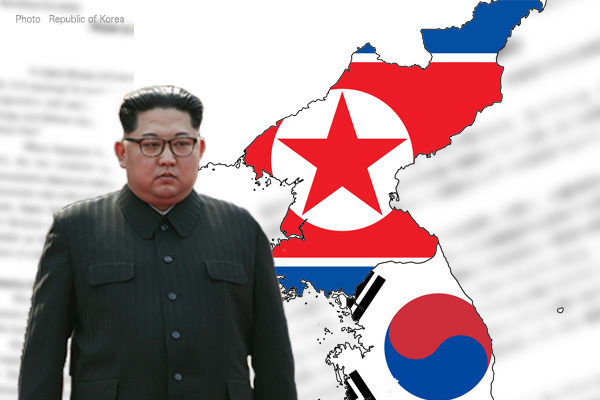North Korean leader Kim Jong Un has called South Korea by its official name, the Republic of Korea, for the first time. North Korea regards the South as a colony of the United States and does not recognize it as a country, calling it "south Korea" until now. Therefore, Kim’s use of the official name has generated various interpretations.
Confusion spreading among North Korean residents
When visiting the Naval Command on August 28, Kim in a speech said, "Gangster leaders from the U.S., Japan, and the Republic of Korea gathered together and announced that they would regularize various joint military exercises between the three parties, and started implementing them." Kim called the South “Republic of Korea” again when inspecting a command drill under the assumption of an attack on the South at the army General Staff on August 30.
The word “Republic of Korea” in the two occasions was put into parentheses in reports by print media such as the state-run Korean Central News Agency and the Rodong Sinmun (Workers' Newspaper), the official newspaper of the Workers’ Party of Korea. Korean Central Television, however, reported Kim’s remarks as they were, without describing the country name as “so-called.”
In a statement in July, Kim Yo Jong, leader Kim’s younger sister and the de facto No. 2 in the country’s hierarchy, called the South “Republic of Korea” multiple times but her statement was not reported inside North Korea. Leader Kim’s remarks using the word “Republic of Korea” were televised, drawing public attention in the North.
On September 1, Radio Free Asia, affiliated with the U.S. government, reported the following remarks by residents in North Korea:
"I don't understand why the supreme leader suddenly uses the respectful word ‘Republic of Korea’ after accusing south Korea as a colony of the United States. Does the supreme leader call the South ‘Republic of Korea’ because south Korea has a rich life?”
"Since the supreme leader calls the South ‘Republic of Korea,’ it seems that south Korea is strong."
"For decades, when the authorities criticized south Korea, they described it as a scarecrow of the United States or a gang of south Korean puppets. The reason they call the South ‘Republic of Korea’ might have been that they have admitted that they have been overwhelmed by south Korea's military power."
"Are we going in the direction of federated unification because we cannot win our system competition with south Korea that is now an economic powerhouse?"
Instilling the concept of perpetual division
A human rights activist acquaintance of mine who is a North Korean defector heard the following story from a North Korean diplomat stationed abroad:
"We are very shocked by the fact that [Kim Jong Un] called south Korea ‘Republic of Korea.’ The first reason for such remark may be that there was no need to hide the official name any more as much information about south Korea became known in the North. The second reason may be that he might have tried to instill the concept of the perpetual division of the Korean Peninsula as the risk of the unification through South-led absorption has increased at a time when the North is filled with an illusion about south Korea.”
In North Korea, the economy is so distressed that many people are starving to death. As North Korea is overwhelmed by South Korea's enormous economic power, the Yoon Suk Yeol government has been born in the South and enhanced military cooperation between Japan, the U.S., and South Korea. In such circumstances, the Kim Jong Un regime may have an increasing fear that the South could absorb and unify the North.
Tsutomu Nishioka is a senior fellow and a Planning Committee member at the Japan Institute for National Fundamentals and a specially-appointed professor at Reitaku University. He covers South and North Koreas.


